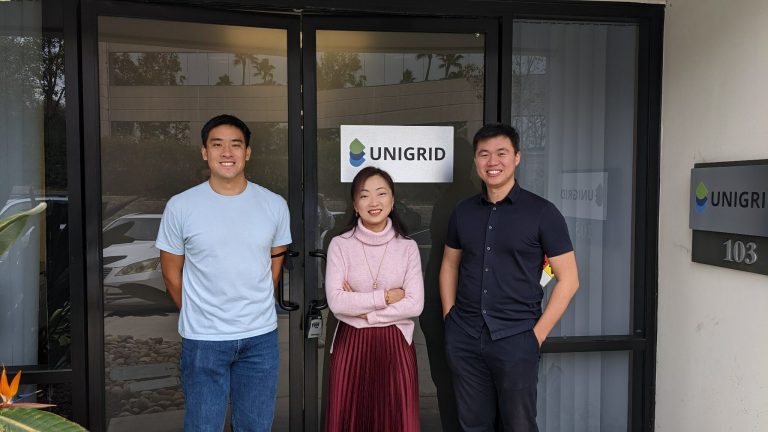UNIGRID Battery, a San Diego-based startup, has recently raised $12 Million for its Series A funding round that was significantly oversubscribed. The investment is led by Transition VC and Ritz Venture Capital with a new partner, Union Square Ventures, and an existing partner Foothill Ventures.
Image Source: LinkedIn
High Energy Density
The company produces advanced high-energy density sodium-ion rechargeable batteries based on alloy anode materials. Specifically, addressing a critical sodium-ion bottleneck, UNIGRID’s battery chemistry increases the volumetric energy density of sodium-ion batteries by twice as much compared to Lithium Iron Phosphate (LFP) batteries.
The CEO of UNIGRID Battery, Darren H. S. Tan said, “Advanced sodium-ion batteries will be a key enabler of widespread, distributed energy storage in the residential, commercial, and industrial markets. As a technology leader in this space, UNIGRID already has commercial-scale orders, and will use the funds to expand manufacturing and customer fulfillment capabilities.”
Abundant Materials and Safety
UNIGRID does not utilize critical or rarer elements like lithium, cobalt, nickel, and copper in its battery chemistry. However, the model is based solely on plentiful resources. It shows that safety and performance-wise, UNIGRID’s sodium-ion batteries surpass those of LFP batteries. Adherence to safety, environmental, and industry requirements is crucial. UNIGRID has to innovate as it also works under regulation necessities. With the scale-up of productions, UNIGRID requires to go through research and development to enhance performance, safety, and durability.
The Partner at Transition, Mona Alsubaei conveyed, “To keep up with intermittent renewables and to electrify many end-applications, we need more energy storage. Storage that is safe, affordable, and made from abundant resources. Our venture partner Bruis has been following UNIGRID’s journey for over a year. The technology surpasses industry standards in terms of energy density and safety metrics. The UNIGRID team couples the technology breakthrough with commercial execution that we rarely see from startups at this stage.”
Drop-in Compatibility
One of the significant advantages of UNIGRID is its seamless integration with the conventional Lithium-ion (Li-ion) battery fabrication process. Also, it should utilize off-the-shelf parts that are easily accessible from the existing supply chain network. This approach facilitates direct collaboration with battery manufacturing partners and allows UNIGRID to increase its products’ production without investing in highly specialized equipment or altering tools.
Unprecedented Performance Demonstration
The performance enhancement, as witnessed by UNIGRID’s sodium-ion batteries, is unique not only for stationary storage but also for the growing electric mobility market. Taking into consideration basic problems, including safety, the ability to operate at high and low temperatures, and the pressure of reducing the price of electric vehicles, UNIGRID is ready to act in the market of energy storage.
The Managing Director at Ritz Venture Capital, Sangbin Ong said, “The unprecedented performance demonstrated in UNIGRID’s sodium-ion batteries presents a unique opportunity not only in the stationary storage space but also in the fast-growing electric mobility space, addressing core challenges of safety, wide temperature operation and downward price pressures of electric vehicles.”
Challenges UNIGRID faces in scaling up production
Opportunities and challenges exist for scaling up the manufacturing of new and emerging technologies such as UNIGRID’s sodium-ion batteries. It is vital to guarantee the constant availability of raw materials, particularly sodium. Increasing production quantities might put pressure on some supply chains and call for sustainable sourcing of the materials.
Another positive aspect of UNIGRID is its adaptability to current lithium-ion battery production facilities. However, retrofitting this infrastructure for sodium-ion production requires capital and knowledge. Quality control is very important especially when it is dealing with mass production. Sameness means that it is crucial to conduct extensive tests and have strict control of quality to minimize the possibility of defects.
Cost competitive with lithium-ion batteries is difficult to obtain. Sodium-ion materials are cheaper than lithium-ion materials, nevertheless, reduction of production costs and waste products is paramount. Market challenges and persuading a manufacturer, investors, and the end-users to adopt UNIGRID with sodium-ion technology.
Conclusion
As the world looks for safer, cheaper, and more sustainable energy storage materials from the most abundant elements on earth, UNIGRID Battery’s sodium-ion technology is underpinned for the future. UNIGRID has a challenge of how innovative it is going to be while keeping costs low as it seeks to increase its market share.

Note: You can reach us at support@scoopearth.com with any further queries.
Linkedin Page : https://www.linkedin.com/company/scoopearth-com/













